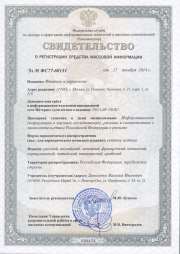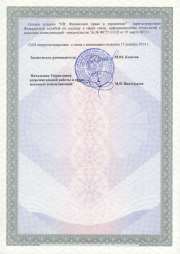MAIN PAGE
> Journal "Finance and Management"
> Rubric "Innovations, innovative activities"
|
Innovations, innovative activities |
|
Ilina S.A. - Business Mechanism for Commercialization of Innovations at Small and Medium Enterprises and Evaluation Algorithm
|
|
pp. 1-11
|
DOI: 10.7256/2409-7802.2016.4.20750
Abstract: The object of the research is the business mechanism. The subject of the research is the commercialization of innovations at medium and small enterprises. The present research has a purpose to define gaps in the current business mechanism of commercialization of innovations at small and medium enterprises, to offer improving measures, and to develop the algorithm for assessing efficiency of the improved mechanism of innovation commercialization at small and medium enterprises. The author also analyzes the nature, contents and structure of the business mechanism of innovation commercialization at small and medium enterprises, and describes legal grounds private mechanisms are based on. Within the framework of the research Ilyina has used the methods of analysis, synthesis, systematization, argumentation and other methods of formal logic. The novelty of the research is caused by the fact that the author offers her own definition of the business mechanism of innovation commercialization. She defines five basic private mechanisms in the structure of the business mechanism of innovation commercialization at small and medium enterprises. The author also defines the main problems of the current business mechanism of innovation enterprises at small and medium enterprises and offers measures to improve it. The author develops the algorithm for assessing the efficiency of the improved mechanism of innovation commercialization at small and medium enterprises.

|
Mamedov M.A., Mamedov T.F. - Formation and development of digital ecosystems based on technological and telecommunication companies in Russia
|
|
pp. 1-19
|
DOI: 10.25136/2409-7802.2022.3.38053
EDN: LSPZQN
Abstract: The process of active digitalization plays an important role in solving a number of urgent tasks, and, in particular, in the field of finance. Together with the development of innovative information technologies and their implementation in all spheres of the economy, multiple optimization of the processes of rendering services, significant changes are observed not only in the types and methods of providing services, but also in general transformation of business models of operating economic entities. The object of research of this article is digital ecosystems based on technological and telecommunication companies. The subject of the research is the principles and models of functioning of digital ecosystems based on technological and telecommunication companies. The relevance of this study lies in the fact that in the conditions of universal digitalization, the boundaries of the services provided by the largest market participants are not only blurred, but their business models are also changing significantly. Within the framework of this study, the authors have revealed approaches to the definition of the concept of ecosystem. The analysis of the largest Russian digital ecosystems based on technology and telecommunications companies, and, in particular, their financial services, is carried out. The analysis was carried out on the basis of such digital ecosystems and their financial services as Yandex, VK Group and MTS. Conclusions are drawn based on the analyzed data and the author's forecasts about the further development of financial services of digital ecosystems based on technological and telecommunications companies are given.

|
Mitrovic S. - Peculiarities of practical application of business intellect technology as the means for informatization of economic analysis
|
|
pp. 17-26
|
DOI: 10.25136/2409-7802.2019.2.29425
Abstract: The subject of this research is the practical aspects of application of the modern information technologies for informatization of the economic analysis of organizations. One of the modern information technologies in the area of economic analysis is business intellect and the created on its basis solution systems. Leaning on the extensive analysis of theoretical sources and practice of application of the business intellect systems in development of economic analysis of organizations in the Russian Federation and abroad, the author designs software solution in the area of analytical procurement and factor analysis of the results of economic activity of the organizations. The conducted research allows making a conclusion that the implementation of business intellect systems contributes to the more effective achievement of the main goal of analytical processing of economic information – determination of the cause-and-effect relationship between the various factors and rational arrangement of information flows for structuring the business model of a company in accordance with the analysis objectives. The scientific novelty lies in the extensive examination of a set of methodological and practical questions of application of business intellect systems in economic analysis of the organizations based on the empirical study, as well as approbation of the author’s solution and suggestion of the following new vectors: assessment of the efficiency of application of information technologies in the sphere of economic analysis based on business intellect; development of general methodology of economic analysis; identification of the potential of business intellect solutions for increasing the quickness and effectiveness of managerial solutions.

|
Mitrovic S., Suits V.P. - Capabilities of business intelligence for improving the efficiency of economic analysis in stressful economic conditions caused by pandemic
|
|
pp. 21-37
|
DOI: 10.25136/2409-7802.2021.4.36811
Abstract: From the perspective of economic analysis, the phenomenon of business intelligence (BI), which is the main subject of this research, is described as a version of artificial intelligence oriented towards comprehensive analysis of high data volume and its transformation into applied knowledge on the economic activity of organizations. Emphasis is placed on the feasibility and peculiarity of implementation of business intelligence systems in stressful economic conditions caused by pandemic on the global and national scale. The empirical part of research lies in the development and testing of the intelligent solution in the area of information and analytical support for economic analysis. The acquired conclusions prove that the current situation on the global economic market promotes further development of methodology for implementing information technologies, and business intelligence in particular, in the economic analysis of business activity. In order to meet the specific needs of end-users of business intelligence systems, was developed the tool for calculating the economic efficiency of medical insurance for health improvement of the personnel. It is substantiate that innovative BI- technologies help to integrate and successfully apply the solutions of business analysis at any level of corporate management. The authors outline the leading parameters of the ideal version of business intelligence, as well as justify that the use of business intelligence systems in the area of information support for economic analysis gives a multiplicative effect: - contributes to the improvement of economic analysis, efficiency of implementation and accuracy of data; - ensures the effectiveness of economic analysis for achieving best result with relatively low cost and maximum utilization time; - provides acceptable relevance of the data that underlie the management decisions, leaving out subjectivism.

|
Nikolaev P.V. - Fundamentals of strategic leadership of the digital ecosystem business model
|
|
pp. 44-57
|
DOI: 10.25136/2409-7802.2023.3.68956
EDN: GUIHTW
Abstract: In the modern world, due to the development of Internet technologies, the activity of companies in the digital environment is becoming increasingly important. The most successful of them base their activities on a special kind of business model Ц the digital ecosystem, which is a unique combination of factors that allow the company to occupy a strategically leading position and be the most cost-effective. The paper characterizes and reveals the most characteristic features of the business model of the digital ecosystem, as well as clearly demonstrates the factors of competitiveness of digital ecosystems. Also, this work allows a deeper understanding of the essence of digital ecosystems as a key element of the modern economy, revealing their role in ensuring strategic leadership and sustainable competitiveness of companies in the digital age. Among the methods used were a comprehensive review of existing literature, case analysis, surveys and interviews with business leaders and experts in the field, a comparative analysis of case studies. The need for effective leadership in the digital age is widely recognized by both the business community and academia. However, there is still much to learn about the specific factors that determine successful leadership strategies in this new digital world. This research aims to identify the key features of successful leadership strategies in the digital age, focusing on the business models of digital ecosystems that allow you to take a leading position in the global market. The scientific novelty of this work lies in an in-depth analysis of the impact of digital technologies on the strategic leadership of companies and the identification of specific aspects that shape the success of digital ecosystems in a competitive global environment. This research aims to fill gaps in understanding the key factors that ensure strategic leadership in the era of digital transformation.

|
Lapenkova N.V., Firsov D.V. - Cluster as the mechanism for neo-industrialization of the economy
|
|
pp. 47-60
|
DOI: 10.25136/2409-7802.2021.3.35430
Abstract: The subject of this research is various approaches towards the definition of clusters applicable to economic relations, as well as their key characteristics. Special attention is given to the analysis of the existing forms and types of clusters. The authors describe the role and place of clusters in neo-industrialization process, since cluster is not just a form of business organization, but also a form of social interaction and reproduction. Due to the ability of a cluster to accumulate and use knowledge independently, it should be viewed as the mechanism for neo-industrialization of the economy, as well as an integral element for ensuring regional competitiveness. The article notes a substantial difference between the cluster form of organization and the holding form of organization based on the Russian and foreign research, as well as the differences between economic clusters and territorial production complexes, which are characteristic to sectoral approach. The conclusion is made that the prerequisite for the emergence of cluster is not the solution of the administrative guidance system, but a natural need of the business, favorable conditions for integration, and availability of the necessary infrastructure. The novelty consists in viewing cluster as the mechanism for neo-industrialization of the economy. It is underlined that clusters create a synergistic effect for the global region they are located in, as well as for the economies of the countries, separate regions or territories of these countries. The authors indicate the need for elaboration of the new approach towards the development of cluster policy. The new cluster policy is intended to regulate the industrial innovation process in the Russian Federation.

|
Safiullin M.R., Savelichev M.V., El'shin L.A. - Cryptocurrency potential in the context of transition of global economy to the sixth technological paradigm
|
|
pp. 74-85
|
DOI: 10.25136/2409-7802.2020.3.33813
Abstract: This article explores the potential of using cryptocurrency as universal currency in the conditions of transition of the global economic system towards sixth technological paradigm. The goal of this research consists in analysis of the patterns of co-evolution of the global financial system, technological system, and global economy. Based on the historical material, the author demonstrates how shift in technological paradigms is accompanied by financial crises, and result in the changes of the world financial system. Over the course of time, the gold served as the universal currency, but the advancement of technologies demanded the transition towards more flexible forms of world currency based on the national currencies of most industrialized countries. Currently, the transition to the technology of the sixth technological paradigm is followed by the global financial crisis. The U.S. dollar is not handling the functions imposed by the latest technologies upon monetary systems. The conclusion is made that finite currencies are being replaced by an innovative generation of monetary systems that are based on cryptocurrency. The authors systematize the innovation forms of investment, accounting, keeping and saving of funds, which are based on cryptocurrency and blockchain. It is demonstrated that innovation financial instruments, including different types of cryptocurrency, tokens, smart contracts, and cryptocurrency exchanges, open new opportunities for effective investment in the technologies of sixth technological paradigm. The results of research can be valuable for the government branches in establishment of the policy for usage of cryptocurrency and blockchain for entrepreneurs dealing with developments in the area of practical implementation of cryptocurrency as innovative currency.

|
Baev S.A. - Theoretical grounds of the development of innovation infrastructure
|
|
pp. 83-98
|
DOI: 10.25136/2409-7802.2021.4.36730
Abstract: The object of this research is the innovation infrastructure. The subject is the key theoretical approaches towards comprehension of innovation infrastructure, subsystems of innovation infrastructure, role of the state in formation and development of innovation infrastructure, as well as problems of institutionalization of innovation environment in the Russian Federation at the current stage. The scientific novelty of this article is reflected in the following aspects: formulation of the original definition of innovation infrastructure on the basis of systematization of theoretical approaches towards interpretation of innovation infrastructure in Russian science; development of the original approach towards classification of subsystems of innovation infrastructure; proposal of the methods for eliminating the flaws inherent to institutionalization of innovations in Russia at the present stage. The main conclusions lie in the following statements: 1) the term “innovation infrastructure” should be defined as “a set of interrelated organizations and institutions aimed at ensuring the implementation of innovation projects”; 2) innovation infrastructure consists of the five subsystems, two of which (production-technological and financial) are central, and three are (information-consulting, human resource, and sales) are supporting; 3) strong coordination of all subsystems of innovation infrastructure in modern Russia requires adhering to cluster arrangement of innovation infrastructure. The concentration of all enterprises in a single space would allow maximizing their efficiency, as well as reducing the costs. Clusters can be formed in accordance with one of the models that are actively used in the developed countries, such as science and technology parks and technopolises.

|
Makarova M.V. - Leading Scientific Associate, Center for Research of State Administration Issues of the Institute of Economics of the Russian Academy of Sciences
|
|
pp. 105-117
|
DOI: 10.25136/2409-7802.2019.2.25750
Abstract: The subject of this research the current and upcoming trends of state policy aimed at support of small and medium businesses. The author reviews the new institutional formations. Small and medium business is the backbone for country’s strong economy. The goal is to answer the question of how effective is the state support of small and medium business in this regard. The object of this research is the state policy of the Russian Federation for supporting small and medium businesses (SMB). Namely the small and medium businesses as the basics of formation of the larger innovation structures. The author concludes that state financial backing of the subjects of SMB is based on subsidized loans aimed at increasing operation and investment capitals, as well as providing guarantees and suretyship by specially formed federal and regional institutions. The results obtained from the analysis of organizational block demonstrate the following: state support of the subjects of SMB is aimed at the sectors with prevailing policy of import substitution; electronic sources, offered by various government resources, require additional revision and testing, with consideration the opinion of potential entrepreneurs; expansion of educational capacity in the area of financial literacy, basis of entrepreneurship, along with teaching online services in educational establishments.

|
Parfenova M.V. - Development of Measures Aimed at Increasing Efficiency of a Corporate Innovation Policy (the Case Study of OOO 'AgroPromServis'
|
|
pp. 176-180
|
DOI: 10.7256/2409-7802.2016.3.20413
Abstract: As a result of an established innovation policy that acts as a catalyzer of the financial economic activities, OOO 'AgroPromServis' is a financiall sound company and has a sustainable profit according to the results of the period under research (2013 - 2015). Nevertheless, indicators showing profit before taxation and net profit of the company are rather insignificant and profitability ratios are not high. Moreover, OOO 'AgroPromServis' does not conduct an efficient innovation policy because their annual investment of assets into main funds and equipment assembly have not increased the economic added value d of the company over the period since 2013 till 2015. Quite on the contrary, the economic added value has shown a tendency towards decreasing which also demonstrates the decline in the company's value. Generally, the main strategic purpose of the development of the aforesaid company is to increase its economic and technological efficiency. To achieve the purpose, it is planned: to develop prospective areas; to implement new production technologies; to launch production of new kinds of products, etc. The analysis of the innovation policy has allowed to discover the main problems and gaps which, first of all, are the following: 1) innovation policy of OOO 'AgroPromServis' involves plain reproduction which does not increase efficiency of their financial and economic activity in general; 2) due to low volumes of net profits, the company has a shortage of internal sources to fund investment activities; 3) projects executed by the company are not efficient enough because the company has a limited fund for financing all desirable investment projects and therefore they have to choose between investment projects trying to achieve the best balance between risks and profitability of projects as well as taking into account their capital-ouput ratio, i.e. necessary expenses.

|






